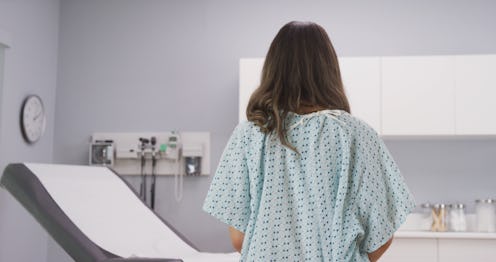Life
Would You Take A Vaginal Fluid Donation To Get Rid Of BV?

Bacterial vaginosis, often referred to as just BV, is an uncomfortable condition that can occur when your vagina's microbiome — aka, the healthy mix of bacteria and yeast that keep your vagina running smoothly — gets thrown out of whack. BV is typically treated with prescription medication, but it is known to recur or become chronic. Researchers from Johns Hopkins University is now suggesting that a vaginal fluid donation could treat bacterial vaginosis, because these donations colonize the recipient vagina with a mix of bacteria that puts the biome back in balance (similar to how fecal microbiota transplants are seen to help gut infections).
"Bacterial vaginosis is very common, is often highly recurrent after antibiotic treatment, and innovative treatments are needed," lead study author Dr. Laura Ensign-Hodges tells Bustle. It's caused by the over-abundance of various kinds of bacteria commonly found in the vagina, and the recurrent kind — which won't go away even with repeated treatments — can stymie doctors. Untreated BV can also increase a person's risk of contracting sexually transmitted illnesses like chlamydia, according to the Office on Women's Health, and can cause infections of the cervix, the uterus lining, and the fallopian tubes. Now the research team hopes to avoid antibiotics to fight BV by using bacterial transplants from other people to fight overgrowth.
The proposal by the research team, published in Frontiers in Cellular & Infection Microbiology, is relatively simple. "We’re proposing to use vaginal fluid from women with healthy vaginal microbiota (donors) to transplant the bacteria to women with bacterial vaginosis," says Dr. Ensign-Hodges. The team used a small pilot study of 20 women to examine how to screen potential donors. All the people in the study collected their fluids themselves, using five vaginal swabs, on two separate occasions over a 20-day period. Using analysis of the fluids themselves and blood and urine samples from the subjects, the team determined that seven of them could be excellent candidates for donation of healthy vaginal fluid, based on their bacterial cultures.
Dr. Ensign-Hodges and her team believe that this is the first step towards an effective treatment system for BV based on transplants. "Establishing a donor system would increase the safety, consistency, and accessibility of the approach," she says. The next step is a test to see if donations screened and gathered in this way would help women with bacterial vaginosis. Dr. Ensign-Hodges told the BBC that the program now has FDA approval to begin offering people transplants, and plans to begin with 40 people once they have funding.
The donation program concept is an exciting one for vaginal health. "This is a ground-breaking project on behalf of women and led by a very talented, creative woman scientist," Dr. Craig Hendrix, MD, who was involved in the study, tells Bustle. It's early days for fluid transplants, as the process still needs to be proven to work and provide observable benefits in people with recurrent BV, but it's a definite move forwards — and even if it seems not to work for BV, it may form the basis for donor programs for other illnesses and conditions.